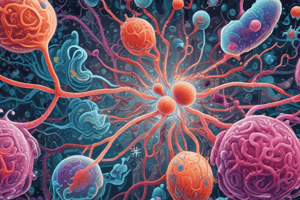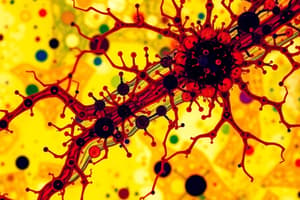Podcast
Questions and Answers
Who is often credited with the invention of the microscope?
Who is often credited with the invention of the microscope?
Hans and Zacharias Janssen
What significant improvement did Galileo Galilei make to the microscope?
What significant improvement did Galileo Galilei make to the microscope?
In which year did Robert Hooke describe cells?
In which year did Robert Hooke describe cells?
1665
Robert Hooke coined the term 'cell' from the Latin word 'cella'.
Robert Hooke coined the term 'cell' from the Latin word 'cella'.
Signup and view all the answers
Which scientist challenged spontaneous generation in 1858?
Which scientist challenged spontaneous generation in 1858?
Signup and view all the answers
Galileo called his device an ______.
Galileo called his device an ______.
Signup and view all the answers
What did Anton van Leeuwenhoek first observe with his microscope?
What did Anton van Leeuwenhoek first observe with his microscope?
Signup and view all the answers
The first microscopes were able to magnify up to 20 times.
The first microscopes were able to magnify up to 20 times.
Signup and view all the answers
Who is credited with the invention of the first microscope?
Who is credited with the invention of the first microscope?
Signup and view all the answers
What did Robert Koch discover in 1882?
What did Robert Koch discover in 1882?
Signup and view all the answers
Robert Hooke first coined the term 'cell' after observing live microorganisms.
Robert Hooke first coined the term 'cell' after observing live microorganisms.
Signup and view all the answers
What significant improvement did Galileo Galilei make to the microscope?
What significant improvement did Galileo Galilei make to the microscope?
Signup and view all the answers
The first known observation of live microorganisms was made by Anton van __________.
The first known observation of live microorganisms was made by Anton van __________.
Signup and view all the answers
What did Robert Hooke observe to coin the term 'cell'?
What did Robert Hooke observe to coin the term 'cell'?
Signup and view all the answers
What microorganism did Robert Koch discover in 1882?
What microorganism did Robert Koch discover in 1882?
Signup and view all the answers
Which scientist introduced the concept of biogenesis?
Which scientist introduced the concept of biogenesis?
Signup and view all the answers
Louis Pasteur resolved the issue of spontaneous generation.
Louis Pasteur resolved the issue of spontaneous generation.
Signup and view all the answers
In which period was the Golden Age of Microbiology?
In which period was the Golden Age of Microbiology?
Signup and view all the answers
Study Notes
History of the Microscope
- The first microscope was invented around 1590, with an unclear inventor; claims include Hans Lippershey and the Janssen father-son duo.
- Lippershey, a spectacle maker born in 1570, settled in Middelburg, Holland, during a period of artistic and scientific innovation.
- Galileo Galilei improved microscope design in 1609, calling it an "occhiolino" or "little eye," but was more focused on telescope innovations.
- Robert Hooke enhanced the microscope's use, observing specimens like snowflakes and plant cells, coining the term "cell" in 1665 from the Latin "cella" due to his cork observations.
- Hooke's findings were published in "Micrographia."
Janssen vs. Lippershey
- Historians generally credit the Janssens with the invention of the microscope due to evidence from Dutch diplomat William Boreel’s letters.
- Boreel suggested Zacharias Janssen initiated microscope development in the early 1590s, although he did not see one until later.
- A museum in Middelburg houses one of the earliest Janssen microscopes, dated to 1595.
Advances in Microscopy
- Compound microscopes, developed in the early periods, offered more magnification but produced distorted images compared to single-lens designs.
- Antoine van Leeuwenhoek, working in the 1670s, created high-powered single-lens microscopes and was the first to describe sperm and microorganisms like yeast and bacteria.
Key Theories in Microbiology
- Robert Hooke's 1665 discovery of cells laid the foundation for the Cell Theory.
- Rudolf Virchow introduced biogenesis in 1858, arguing against spontaneous generation after observing mushrooms sprouting from decaying matter.
- Louis Pasteur further validated the theory of biogenesis in 1861, demonstrating that microorganisms are ubiquitous.
The Golden Age of Microbiology
- Spanning from 1857 to 1914, this era marked significant advancements and discoveries in the field of microbiology, emphasizing the importance of microorganisms in health and disease.
History of the Microscope
- The first microscope was invented around 1590, with an unclear inventor; claims include Hans Lippershey and the Janssen father-son duo.
- Lippershey, a spectacle maker born in 1570, settled in Middelburg, Holland, during a period of artistic and scientific innovation.
- Galileo Galilei improved microscope design in 1609, calling it an "occhiolino" or "little eye," but was more focused on telescope innovations.
- Robert Hooke enhanced the microscope's use, observing specimens like snowflakes and plant cells, coining the term "cell" in 1665 from the Latin "cella" due to his cork observations.
- Hooke's findings were published in "Micrographia."
Janssen vs. Lippershey
- Historians generally credit the Janssens with the invention of the microscope due to evidence from Dutch diplomat William Boreel’s letters.
- Boreel suggested Zacharias Janssen initiated microscope development in the early 1590s, although he did not see one until later.
- A museum in Middelburg houses one of the earliest Janssen microscopes, dated to 1595.
Advances in Microscopy
- Compound microscopes, developed in the early periods, offered more magnification but produced distorted images compared to single-lens designs.
- Antoine van Leeuwenhoek, working in the 1670s, created high-powered single-lens microscopes and was the first to describe sperm and microorganisms like yeast and bacteria.
Key Theories in Microbiology
- Robert Hooke's 1665 discovery of cells laid the foundation for the Cell Theory.
- Rudolf Virchow introduced biogenesis in 1858, arguing against spontaneous generation after observing mushrooms sprouting from decaying matter.
- Louis Pasteur further validated the theory of biogenesis in 1861, demonstrating that microorganisms are ubiquitous.
The Golden Age of Microbiology
- Spanning from 1857 to 1914, this era marked significant advancements and discoveries in the field of microbiology, emphasizing the importance of microorganisms in health and disease.
Studying That Suits You
Use AI to generate personalized quizzes and flashcards to suit your learning preferences.
Related Documents
Description
Explore the fascinating history of the microscope in this introductory quiz for Week 1 of Microbiology. Learn about its invention in the 1590s and how it revolutionized the study of microorganisms. Test your knowledge on key milestones and the evolution of this essential scientific tool.




